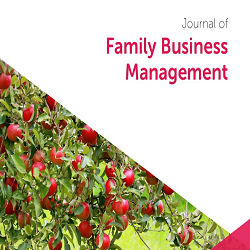CALL FOR PAPERS Journal of Family Business Management Special Issue on “Responsible Ownershipin Family Firms: a focus on the Family”
SI_JFBM_Responsible Ownership_Final
Guest Editors:
Luis Díaz-Matajira (luidiaz@uniandes.edu.co), Universidad de los Andes, Colombia
Kathleen Randerson (kranderson@audencia.com), Audencia Business School, France
Joshua J. Daspit (josh.daspit@txstate.edu), Texas State University, USA
Cristina Aragón-Amonarriz (cristina.aragon@deusto.es), Deusto Business School, Spain
Manuscript Submission Deadline: OCTOBER 1, 2019
The family’s involvement in firm governance is noted as a core driver that creates heterogeneity among family firms (Daspit, Chrisman, Sharma, Pearson, & Mahto, 2018). This form of governance allows the family to exert decision-making influence and control in the firm, while also pursuing actions that are for the good of the family (Carney, 2005). Although this governance form allows the family to exert control over the firm, the goals of the family and firm are not always aligned, and, in fact, can be quite divergent. Thus, for both the business and the family to succeed, responsible decision-making and responsible actions are paramount.
Responsible ownership is defined as the “active and long-term commitment to the family, the business, and the community, and [the ability to balance] these commitments with each other” (Lambrecht & Uhlaner, 2005). A responsible owner engages in behavior that serves the collective good of both the owners and the firm (Uhlaner, Flӧren, & Geerlings, 2007). When the family is in a governance role, responsible family ownership manifests when the family, as a group, is committed to balancing the rights and privileges of ownership with a long-term commitment to family and other (nonfamily) stakeholders of the firm (Aragón-Amonarriz, Arredondo, & Iturrioz-Landart, 2017).
Although studies are beginning to examine the effect of responsible ownership on family firm assets and outcomes (e.g., Berent-Braun & Uhlaner, 2012), even less is known about how family firms develop and sustain responsible ownership across generations. For example, Aragón-Amonarriz et al. (2017) suggest that family social capital preserves responsible family ownership across generations, yet Bergamaschi and Randerson (2016) note that differing types of family firms yield varied preferences for engaging in socially responsible actions. Further, while researchers are beginning to examine the various pathways used by families to instill responsible ownership in the future generation, these processes, intentions, and norms vary greatly across geographical and cultural contexts (e.g., González Couture & Díaz Matajira, 2015).
In all, given the nascent nature of insights and the growing importance of responsible governance, a special issue on responsible ownership promises to offers a substantial advancement to the field of family business. The objective of this special issue is to publish theoretical and empirical work that highlights notable progress and furthers understanding of responsible ownership in the family firm. A non-exhaustive list of possible topics includes:
- How do family members become responsible owners? How do family firms strategicallyprepare current and next generation owners?
- What is the role played by family values and/or different types of reciprocity in developingresponsible ownership that is sustainable in the family firm?
- What theories from family science offer advanced understanding of how responsible familyownership is developed and leveraged in the family firm?
- What are the effects of cultural, economic, institutional, and other contextual influences onresponsible ownership and the family?
- How do family owners balance the responsibility of serving multiple stakeholders with oftendivergent interests?
- How does responsible family ownership (simultaneously) affect family and firm financial,nonfinancial internal, and nonfinancial external outcomes?
Submission Guidelines: All submissions are subject to a standard double-blind review process. Manuscripts must be original, unpublished works not concurrently under review for publication at another outlet and are expected to follow the standard formatting guidelines for Journal of Family Business Management. Final manuscripts are to be submitted via the journal’s submission system (https://mc.manuscriptcentral.com/jfbm) no later than October 1, 2019. Authors should indicate “Special Issue” as the manuscript type and must clearly specify that the submission is for the special issue on “Responsible Ownership in Family Firms” in the cover letter. Publication of this Special Issue is expected for 2021. Workshop: Authors interested in further developing an idea for this special issue are encouraged (but not required) to submit an abstract to the European Institute for Advanced Studies in Management (EIASM) meeting that will be held at Audencia Business School in Nantes, France, May 23-25, 2019. The deadline for submitting conference abstracts is January 21, 2019. All conference submissions are to be made via the EIASM submission system (http://www.eiasm.org/frontoffice/event_announcement.asp?event_id=1381). Please note that acceptance to the workshop does not guarantee nor is it required for acceptance to the special issue. REFERENCES
Aragón-Amonarriz, C., Arredondo, A. M., & Iturrioz-Landart, C. (2017). How can responsible family ownership be sustained across generations? A family social capital approach. Journal of Business Ethics. DOI 10.1007/s10551-017-3728-7
Bergamaschi, M., & Randerson, K. (2016). The futures of family businesses and the development of corporate social responsibility. Futures, 75, 54-65.
Carney, M. (2005). Corporate governance and competitive advantage in family-controlled firms. Entrepreneurship Theory and Practice, 29(3), 249–265
Berent-Braun, M. M., & Uhlaner, L. M. (2012). Family governance practices and teambuilding: Paradox of the enterprising family. Small Business Economics, 38(1), 103-119.
Daspit, J. J., Chrisman, J. J., Sharma, P., Pearson, A. W., & Mahto, R. V. (2018). Governance as a source of family firm heterogeneity. Journal of Business Research, 84, 293-300.
González Couture, G., & Díaz Matajira, L. (2015). The next generation: Pathways for preparing and involving new owners in Colombian family businesses. In P. Sharma, N. Auletta, R.-L. DeWitt, M. J. Parada, & M. Yusof (Eds.), Developing Next Generation Leaders for Transgenerational Entrepreneurial Family Enterprises (p. 49-75). Northhampton, MA: Edward Elgar.
Lambrecht, J. & Uhlaner, L.M. (2005). Responsible ownership of the family business: State-of-the-art, position paper prepared for FBN-
IFERA World Academic Research forum, EHSAL, Brussels, September. https://www.researchgate.net/publication/228379201_RESPONSIBLE_OWNERSHIP_OF_THE_FAMILY_BUSINESS_STATE-OF-THE-ART
Uhlaner, L.M., Flören, R. & Geerlings, J.R. (2007). Ownership commitment, family ownership and performance in the privately-held firm, Small Business Economics Journal, 29(3), 275-293.

